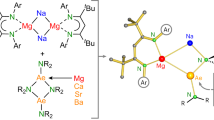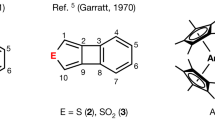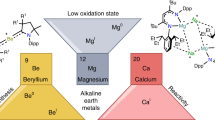Abstract
THE trivalent metal ions, for example, Cr3+, Fe3+ and Al3+ form a variety of basic acetates which are usually supposed to contain complex ions of the type [M 3(Ac)6(OH)2]+ (refs. 1 and 2). In addition, a very few compounds containing only one hydroxyl group have been described2. The whole group of compounds is of considerable interest in view of their unusual magnetic properties3,4.
This is a preview of subscription content, access via your institution
Access options
Subscribe to this journal
Receive 51 print issues and online access
$199.00 per year
only $3.90 per issue
Buy this article
- Purchase on Springer Link
- Instant access to full article PDF
Prices may be subject to local taxes which are calculated during checkout
Similar content being viewed by others
References
“Gmelins Handbuch der Chemie”, System No. 59 (1932).
Starke, K., J. Inorg. and Nucl. Chem., 13, 254 (1960).
Welo, L. A., Phil. Mag., 6, 481 (1928).
Wucher, J., and Gijsman, H. M., Physica, 20, 361 (1954).
Wilmarth, W. K., Graff, H., and Justin, S. T., J. Amer. Chem. Soc., 78, 2683 (1956).
Wells, A. F., “Structural Inorganic Chemistry”, second ed. (Oxford Univ. Press, 1950).
Author information
Authors and Affiliations
Rights and permissions
About this article
Cite this article
ORGEL, L. Structure of the Trinuclear Basic Acetates. Nature 187, 504–505 (1960). https://doi.org/10.1038/187504b0
Issue Date:
DOI: https://doi.org/10.1038/187504b0
This article is cited by
-
On the thermal decomposition of [Fe2NiO(CH3COO)6(H2O)3]·2H2O
Journal of Thermal Analysis (1991)
-
Trinuclear metal(III) trifluoroacetates
Monatshefte f�r Chemie Chemical Monthly (1984)
-
Fuel antistatic additives and the mechanism of their action
Chemistry and Technology of Fuels and Oils (1980)
-
Tris(triphenylphosphinegold)oxonium salts
Bulletin of the Academy of Sciences of the USSR Division of Chemical Science (1974)
-
Crystal-Molecular Structure and Magnetic Properties of Cr3 (CH3.COO)6 O Cl.5H2O
Nature (1965)
Comments
By submitting a comment you agree to abide by our Terms and Community Guidelines. If you find something abusive or that does not comply with our terms or guidelines please flag it as inappropriate.



